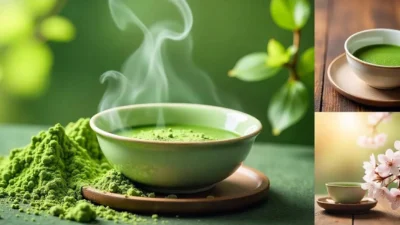Contents
- A quiet start to the journey 🌌
- 1. 🌼 Chamomile: the classic hug in a cup
- 2. 💜 Lavender: liquid tranquility for anxious souls
- 3. 🌿 Peppermint: refresh, release, recenter
- 4. 🍋 Lemon balm: mood-lifting and mind-soothing
- 5. 🌱 Valerian root: deep sleep’s best-kept secret
- ☕ Why tea works: beyond the leaves
- 🪄 Tips to create your evening tea ritual
- 🌌 Final thoughts: make room for stillness
🌙Because sometimes, peace comes in a mug.😌🍵
A quiet start to the journey 🌌
There’s a certain stillness that only comes late at night—when the world goes quiet but your thoughts don’t. If you’ve ever stared at the ceiling, willing sleep to come as your mind replays every awkward conversation, every unfinished task, every “what if”—you’re not alone. I’ve been there. Too many times, in fact.
It was during one of those restless nights that I stumbled upon herbal tea—not the store-bought kind in paper sleeves I used to ignore, but the real deal. Loose herbs. Hand-picked blends. A ritual that began with boiling water and ended with a moment of genuine calm.
That simple act—heating water, choosing leaves, inhaling the steam—became more than just preparation. It became a message to my nervous system: “You’re safe. You can let go now.” 🌿
Below are five herbal teas that have helped me (and countless others) soften the edges of stress and finally rest. Not all at once. Not like a switch. But gradually, gently—like dusk turning to night.
1. 🌼 Chamomile: the classic hug in a cup
There’s something inherently tender about chamomile. It’s the tea our grandmothers sipped, the one we’ve seen in bedtime storybooks. But don’t mistake its softness for weakness. This golden flower is a powerhouse of calm.
🌸 What it feels like: a slow exhale. The comfort of warm blankets and the smell of honey on toast.
🧪 Why it works: chamomile contains apigenin, a natural compound that binds to the brain’s GABA receptors—gently easing anxiety and preparing the body for sleep. It doesn’t knock you out; it simply quiets the internal chatter.
✨ Real story: my sister, who deals with social anxiety, swears by chamomile before big events. “It’s like my pre-game potion,” she jokes. It doesn’t erase her nerves—but it softens them, like background static being turned down.
☕ How to enjoy it best:
- Steep 1–2 tsp of dried chamomile flowers in hot (not boiling) water for 5–7 minutes.
- Add a spoonful of honey or a slice of fresh ginger for warmth.
- Sip slowly, ideally with the lights dimmed and your phone far, far away.
2. 💜 Lavender: liquid tranquility for anxious souls
Lavender isn’t just for linen sprays or bath bombs. When steeped as tea, it’s a deeply calming floral experience—both for your senses and your psyche.
🌺 What it feels like: walking through a sunlit lavender field, breeze on your skin, no phone in sight.
🧠 How it helps: lavender has been studied for its anxiolytic (anxiety-reducing) effects. It works partly by interacting with neurotransmitters that regulate mood and stress responses. Plus, its scent alone has been shown to slow heart rate and reduce cortisol levels.
🪴 Personal ritual: my roommate, an insomniac by nature, brews lavender tea while reading poetry each night. She says it “gives the day a soft landing.”
🔮 Pro tip: Lavender blends beautifully with chamomile or lemon balm. For deeper calm, steep all three together and sip under fairy lights or candle glow.
3. 🌿 Peppermint: refresh, release, recenter
Unlike the others on this list, peppermint isn’t traditionally known as a “sleep” tea—but don’t let that fool you. Its cooling properties and menthol-rich aroma offer a unique kind of mental reset.
💨 What it feels like: a cool breeze on a hot day. That deep breath you didn’t know you needed.
🧘♂️ The science bit: menthol, the active component in peppermint, acts as a natural muscle relaxant and digestive soother. And guess what? When your stomach is calm, your brain tends to follow suit. The gut-brain connection is real.
😮💨 A story: a former coworker used peppermint tea to get through stressful presentations. She’d sip it 30 minutes before speaking, using the act of brewing as a mindfulness anchor. “I imagined the steam carrying my stress away,” she told me once, smiling.
🍃 Brewing notes:
- Use fresh mint leaves if possible—lightly crushed to release oils.
- Steep for 7 minutes.
- Add lemon for brightness or honey for grounding sweetness.
4. 🍋 Lemon balm: mood-lifting and mind-soothing
Lemon balm doesn’t get nearly the love it deserves. With a bright, citrusy scent and subtle minty taste, it’s the unsung hero of herbal calm.
🌞 What it feels like: a sunbeam on your face. A window cracked open to fresh air and quiet.
🧪 Why it matters: lemon balm (Melissa officinalis) is part of the mint family and contains compounds like rosmarinic acid, which help reduce stress and improve mood. Some studies even suggest it supports cognitive clarity—a bonus for those prone to “brain fog.”
📓 Anecdote: during grad school, I drank lemon balm tea every day around 3 p.m. It was my antidote to the dreaded slump. It didn’t hype me up like coffee—it just… lifted the fog. Like turning a light on in a dim room.
🍋 Perfect pairings:
- Combine with lavender or passionflower.
- Add lemon peel or ginger for a gentle zing.
- Great both warm and iced—ideal for warmer evenings when you still crave calm.
5. 🌱 Valerian root: deep sleep’s best-kept secret
Valerian root is intense. Its flavor is earthy, slightly bitter, and honestly, an acquired taste. But if sleep evades you night after night, this is your herbal ally.
🛌 What it feels like: a weighted blanket for your nervous system.
🧬 What it does: valerian increases GABA availability in the brain, slowing down neural activity and reducing the time it takes to fall asleep. It’s often used in herbal blends targeted at insomnia or deep rest.
⚠️ A word of caution: valerian is powerful. Some people feel drowsy or “off” the next morning. It’s wise to start with a small dose and monitor how your body responds.
👩⚕️ A testimonial: my aunt, who went through menopause-related sleep issues, said valerian was the only natural thing that helped. She mixes it with chamomile and hops. “It doesn’t knock me out,” she says, “but it reminds me how to let go.”
☕ Why tea works: beyond the leaves
Herbal teas don’t just work because of their chemistry. They work because they invite pause. And in a culture obsessed with movement and productivity, that pause is medicine in itself.
🧠 On a biological level:
- Most calming teas affect the parasympathetic nervous system—our “rest and digest” mode.
- They help lower cortisol, promote melatonin, and relax muscles—creating optimal conditions for sleep.
💓 On a soul level:
- Brewing tea requires intention: Boil water. Scoop herbs. Wait.
- That act becomes ritual—a meditative moment that tells your body, “It’s safe now.”
🪄 Tips to create your evening tea ritual
- 🌙 Choose a dedicated mug. One that feels like yours and only yours.
- 🎶 Play soft instrumental music or nature sounds while steeping.
- 🕯️ Dim the lights. Let shadows play. Light a candle.
- 📝 Keep a small journal beside your tea tray. Write one sentence about your day.
- 📴 Turn off notifications. Better yet—leave the phone in another room.
- 🌬️ Inhale the steam deeply before your first sip.
🌌 Final thoughts: make room for stillness
Herbal teas won’t solve every worry or erase every anxious thought. But they will create space—small, sacred moments where the noise dims and the breath deepens. In that space, sleep finds you more easily. Clarity returns. The mind stops sprinting.
And sometimes, that’s enough.
So tonight, when the day feels too heavy or your heart too loud, put the kettle on. Let the steam rise. Let the moment stretch. And sip your way back to stillness. 🍃💤














OMG, yes! This totally gets me. I’m constantly replaying embarrassing moments in my head at 3 am. Gonna try this herbal tea thing – sounds way more calming than staring at the ceiling! Thanks for sharing! ✨